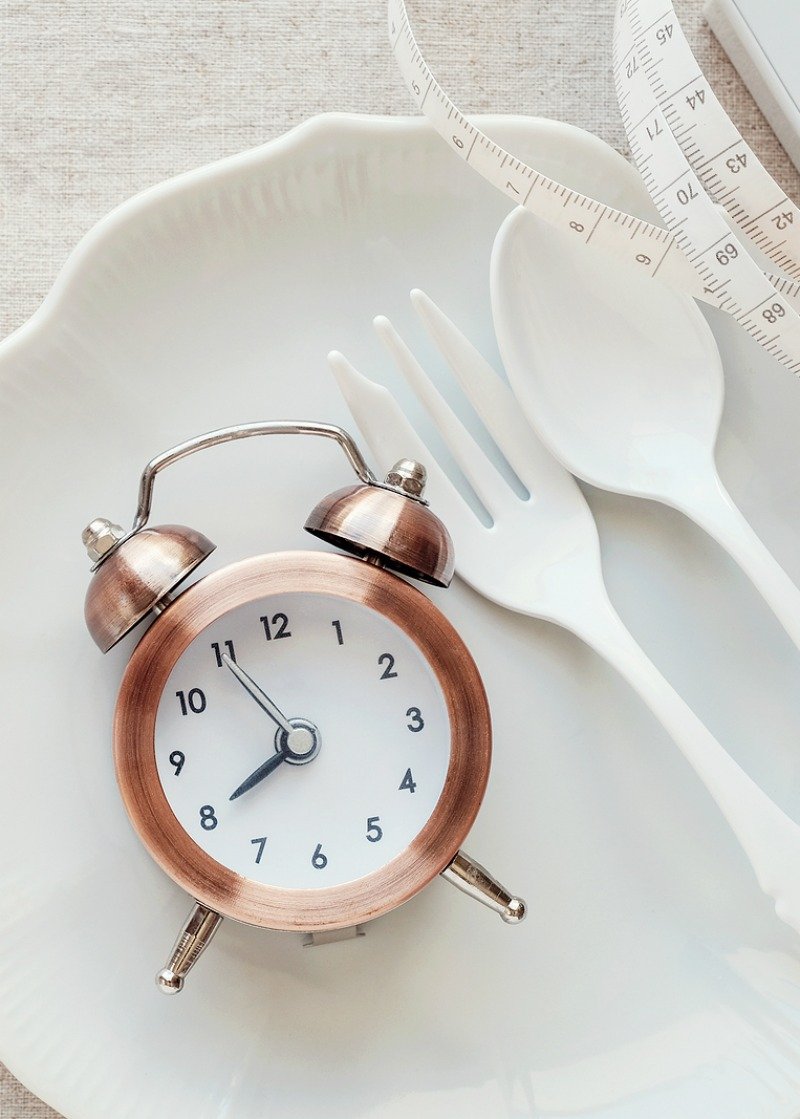
I’ve never completed a diet “cleanse.” When everyone else is giving up coffee, I’m blending mine with butter. Last year, if you’d asked me who was least likely to write about the benefits of intermittent fasting, I would have told you it was me.
And yet here we are, because intermittent fasting helped me increase my energy levels and lose my excess baby weight without changing what I ate . . . only when. And the more I’ve researched it, the more benefits I’ve discovered.
- So what is intermittent fasting, and why is it so awesome?
- Benefits of Intermittent Fasting
- #1: Weight Loss/Healthy Metabolism
- #2: Activates “Cleanup Mode”
- #3: Improves Learning & Memory
- #4: Improves Immune Function
- #5: Lowers Inflammation
- #6: Activates Longevity Genes
- Is intermittent fasting safe for women?
- My experience with intermittent fasting
- Am I ready for this?
- How to intermittent fast
- How long should I aim for?
- What should I eat to fast safely?
- Bonus Tip: Water can help activate autophagy
So what is intermittent fasting, and why is it so awesome? ^
Intermittent fasting (IF) is not a diet, it’s a lifestyle in which you limit food intake to a certain time window during the day. For example, I eat all my meals within a 12 hour window between 8am and 8pm, and I fast through the evening and while I’m sleeping. (This was really hard for me at first, because I was a huge late-night snacker, but it got easier very quickly.)
There are a lot of patterns of intermittent fasting, such as:
- Eating all meals within a 12 hour window (say, from 8am – 8pm), then fasting for 12 hours
- Eating all meals within a 10 hour window (usually 9am – 7pm), then fasting for 14 hours
- Eating all meals within an 8 hour window (usually 10am-6pm), then fasting for 16 hours (You’ll often see this referred to as 16:8 intermittent fasting)
- Every other day fasting (eating nothing one day, then eating normally the next)
- Extended fasting
Although there may be certain situations when longer fasts might be appropriate, more is not usually better when it comes to intermittent fasting. Extended fasts can disrupt hormone balance – especially in women – which can lead to poor sleep, fatigue, fertility issues, depression, and other problems. (source 1, source 2)
On the flipside, a daily fasting cycle works to balance the ebb and flow of leptin (the fat burning hormone), insulin (the fat storage hormone), and other hormones that we make throughout the day. According to Dr. Lori Rose, who is my co-author for this post, that’s because our digestive tract contains a “peripheral body clock” that syncs up with our 24-hour circadian rhythm, and periods of daily feasting/fasting help “set” the clock in the same way that light and dark does.

Benefits of Intermittent Fasting ^
Before we jump in, please keep in mind that this article is for informational purposes only and is based on the opinions of the authors. It is not medical advice and is not intended to be a substitute for professional medical advice, diagnosis, or treatment. As always, please use common sense and speak with your healthcare provider if you have a medical condition that might contraindicate intermittent fasting or any other lifestyle change. Please see my full disclaimer here.
With that in mind, here are some of the top benefits of intermittent fasting.
#1: Weight Loss/Healthy Metabolism ^
Remember how I said it’s not so much about what you eat, but when? Here’s a study from Salk University that explains what I mean:
We put two groups of mice on different eating regiments for 100 days. Both groups ate a high-fat, high calorie diet. The first group was allowed to eat whenever they wanted, grazing throughout the day and night. The other mice had access to food only for eight hours at night, since mice are nocturnal. The results were astonishing. Despite consuming the same amount of calories everyday, the mice that ate on a restricted eight hours were nearly 40 percent leaner and showed no signs of inflammation or liver disease and had healthy cholesterol and blood sugar levels. The group of mice that nibbled day and night became obese, developed high cholesterol, high blood sugar, fatty liver disease and metabolic problems.” (source, emphasis mine)
Even more fascinating is the fact that when the time-restricted feeding mice were allowed to eat freely on the weekends, they still had the same lean mass ratio as mice who were restricted seven days a week. (source)
Research on humans supports these findings – this study found that daily fasting improved insulin sensitivity in women, and this one found that volunteers who ate earlier in the day lost more fat than those who ate later in the day, even though both groups were consuming the same number of calories.
So what’s happening here? As mentioned in this post on leptin resistance and how to reverse it, our fat cells do more than just store energy and keep us warm – they secrete a hormone called leptin. When our bodies have adequate energy reserves (fat stores), leptin calms our hunger. When we need more nourishment, leptin dials up our desire for food.
At least that’s how it’s supposed to work.
When we graze all day and all night, unfortunately, our bodies often lose the ability to “hear” what leptin is telling us, and we end up feeling hungry even when we have ample energy stores. Intermittent fasting encourages better leptin signaling so our bodies get the message and we feel satiated.
#2: Activates “Cleanup Mode” ^
Intermittent fasting triggers autophagy, which is literally translated as “cellular eating.” When autophagy occurs, a bunch of little guys called lysosomes go around gobbling up damaged cells, damaged mitochondria, and cancerous cells. These lysosomes and mitochondria are good guys, giving us energy for vitality and cellular regeneration for a vibrant life. Without them, our body fills up with cellular trash and we just can’t function as optimally as possible. Furthermore, negative results like expedited aging and disease occurs because we just aren’t taking out the proverbial trash as efficiently as we should.
Unfortunately, although autophagy should occur naturally, factors like the Standard American Diet (SAD), non-stop grazing/snacking, and a stressful go-go-go lifestyle can suppress it. By intentionally triggering autophagy through intermittent fasting, we’re supporting:
- energy production
- free radical elimination
- and damaged cell elimination
Here’s a real-life example of autophagy in action: This study found that fasting 13 hours per night (which triggers autophagy) may decrease the recurrence risk of breast cancer (because the lysosomes are gobbling up damaged cells).
Prolonging the overnight fasting interval may be a simple, non-pharmacological strategy for reducing a person’s risk of breast cancer recurrence and even other cancers,” said Catherine Marinac, lead author and doctoral candidate at the University of California, San Diego Moores Cancer Center. “Previous research has focused on what to eat for cancer prevention, but when we eat may also matter because it appears to affect metabolic health.”
#3: Improves Learning & Memory ^
According to this study, intermittent fasting increases neuroplasticity (brain flexibility) and the production of new neurons, which “enhance learning and memory.” This study also mentions that it dials up antioxidant defenses, autophagy and mitophagy (the cleanup of our cells and mitochondria), and DNA repair (which slows down aging).
#4: Improves Immune Function ^
In this study, mice that had been intermittent fasting had a stronger immune response to salmonella infection than those who hadn’t .
#5: Lowers Inflammation ^
One of the main causes of inflammation is an excess amount of free radicals within the body, which causes cellular damage. Throughout our daily processes of just living, mitochondria – which are the “batteries” in our cells that give us energy – get damaged. When mitochondria are damaged, they release free radicals which cause inflammation, age-related degeneration, as well as DNA damage.
Also, our energy is reduced due to the reduction in the number of functioning mitochondria. When we fast, we stimulate autophagy, which means that lysosomes gobble up these damaged mitochondria.
#6: Activates Longevity Genes ^
“We found that intermittent fasting caused a slight increase to SIRT3, a well-known gene that promotes longevity and is involved in protective cell responses,” said Michael Guo, who co-authored this study. Another study also found that it increases levels of SIRT1, another longevity gene. (source)
Is intermittent fasting safe for women? ^
The gentle version described above – a 12 hour fast overnight – is generally considered safe. However, pregnant and nursing women have different considerations. Mark Sisson reviewed the available research on pregnancy and intermittent fasting here, and I wholeheartedly agree with his conclusion: Just eat when you and your baby are hungry.
Regarding breastfeeding: In religious traditions that practice intermittent fasting, pregnant and nursing women are usually exempt from participation. There seems to be an inherent wisdom in this approach, because although I know of some women who have practiced intermittent fasting while breastfeeding (under the supervision of their doctor), I personally needed to eat during late night nursing sessions in order to feel my best.
You can read more about what we’ve learned from religious traditions about breastfeeding and fasting over at KellyMom.
My experience with intermittent fasting ^
After the birth of my third baby, I noticed that I didn’t return to my pre-pregnancy weight like I had with my first two . . . in fact, I started gaining weight. Because I was in the process of healing my adrenals, I knew intense workouts would not be my path in getting back to my normal self.
Instead, I worked on aligning my circadian rhythm by wearing orange glasses at night (to improve my sleep, which directly impacts metabolism) and practicing intermittent fasting. Even when I decreased my workouts (because busy!), I found that my body returned to my normal without changing what I eat or anything else.
Am I ready for this? ^
For some of us, intermittent fasting might sound terrifying or even impossible. In reality, gradual changes may be needed in order to transition if we’ve been snacking or eating very often.
Most of us have been told at some point that eating many small meals throughout the day is the best way to be healthy, but although there are probably exceptions based on bio-individuality and other factors, for the most part eating a lot of small meals and snacks works against our biology. Certain functions of our gut – the Migrating Motor Complex (MMC) for example – doesn’t even start functioning until 1.5-2 hours after we finish eating. The MMC is our internal housekeeper that clears excess bacteria, and we want it to clean several times a day in order to prevent inflammation and gut conditions like SIBO.
We also need breaks between eating to encourage the ebb and flow of our fat storage hormone (insulin) and our fat burning one (leptin). Eating too often overstimulates insulin and suppresses leptin. This and other factors can cause blood sugar to become imbalanced, decreasing the time we can go without food before experiencing low blood sugar.
If you have been eating and snacking often, it may take some time to adjust to this new method. That’s ok.

How to intermittent fast ^
So how do we align intermittent fasting with our circadian rhythm to trigger autophagy? Well, rule number one is that autophagy only occurs during fasting (source). Our daily circadian rhythm requires shifts from catabolism (breaking things down, as in digestion and movement) to anabolism (building things up, as in growth and repair).
This shift between catabolism and anabolism is thrown off when circadian rhythm is thrown off, resulting in decreased prolactin, which decreases growth hormone, which decreases autophagy (source). To support autophagy, we need to align our sleep with our circadian rhythm, and align our food with our circadian rhythm as well.
Now, onto the specifics. (Note from Heather: For the sections below, I’m passing the reigns over to my co-author, Dr. Rose.)
How long should I aim for? ^
Generally speaking, we should have a 12-16-hour fasting window each day, although there are probably exceptions due to bio-individuality (source). This can be achieved by stacking our sleeping habits with our eating habits. If we are following the circadian rhythm sleep schedule, then we should be
- eating our first meal between 7-9am, and
- eating our last meal between 7-9pm.
- This will require no late night snacks.
The amazing thing about this simple schedule shift in eating times is that research shows improvements in fat composition and energy levels even when the foods eaten didn’t change (source). This means that even if you don’t change one single thing you are eating, yet you align your sleep and fasting window with your circadian rhythm, you are likely to see an increase in energy and metabolic health.
What should I eat to fast safely? ^
If you start the day with your biggest meal in morning, making sure it includes ample protein and healthy fat, you should be able to start stretching your times in between meals and eventually be able to last through the entire 12-15 hour fasting window. If you include your highest amount of protein at night, you will stay satiated longer.
Again, take this in baby steps. If you currently only have a 9-hour night-time fasting window, don’t jump right to 15 hours. Increase your fasting time incrementally while simultaneously switching to nutrient-dense meals that include ample protein, fat, and veggies. Eventually, your hunger should realign with your natural circadian rhythm and you will be able to make that nightly fasting window and optimize your autophagy.
Bonus Tip: Water can help activate autophagy ^
Another thing you can do to make sure you optimize autophagy is use water at the right times. Usually we go hours without drinking water, and we only drink it with meals (if we are even drinking water at all). However, water intake can be used to better support autophagy. The amino acid leucine stops autophagy (source), so diluting it with water can activate the onset of autophagy.
Decreasing leucine also increases the amino acid cysteine, which increases the antioxidant glutathione and autophagy (source). Glutathione further supports the decrease of free radicals, further supporting the goal of decreasing cellular damage and increasing cellular regeneration. So when should you be diluting your leucine?
Well, autophagy should occur during our fasting window, so the majority of your water should be consumed during this night/morning fast. After you are done with your night time eating window, only drink water. However, you want to make sure and not drink so much water that you will interrupt your sleep. Instead, drink the majority of your water when you first wake up to further push the fasting window, support autophagy, and support free radical reduction. Then wait about 45 minutes upon waking to eat that first big nutrient-dense breakfast and let the daily intermittent fast break.
Note from Heather: I love drinking mineral water in the evening because it feels a bit celebratory and special, but I pretty much have a cup of coffee my hand right after I roll out of bed and breakfast happens shortly after that. There’s the ideal, and there’s life. Do what works for you.
Oh, and just one more thing. Breakfast = Break the daily fast. Even our language knows our circadian rhythm. It’s just a matter of adjusting our habits so we can experience the benefits of working with our biology instead of against it.
This article was medically reviewed by Amy Shah, MD, Medical Advisor to Genexa through partnership with the Mommypotamus Team. As always, this is not personal medical advice and we recommend that you talk with your doctor.
About the authors: This article was coauthored by Heather Dessinger and Dr. Lori Valentine Rose (PhD). Dr. Rose, PhD is a college biology, nutrition, herbal, and wellness instructor, Certified Nutrition Professional (CNP), Registered Herbalist with the American Herbalist Guild, and is Board Certified in Holistic Nutrition. She created, developed, and instructs the Hill College Holistic Wellness Pathway, the most thorough, affordable, degreed wellness program in the country. She loves spreading love and light, and helping others feel awesome on the inside and out so they can live their dreams and make this world more awesome!




